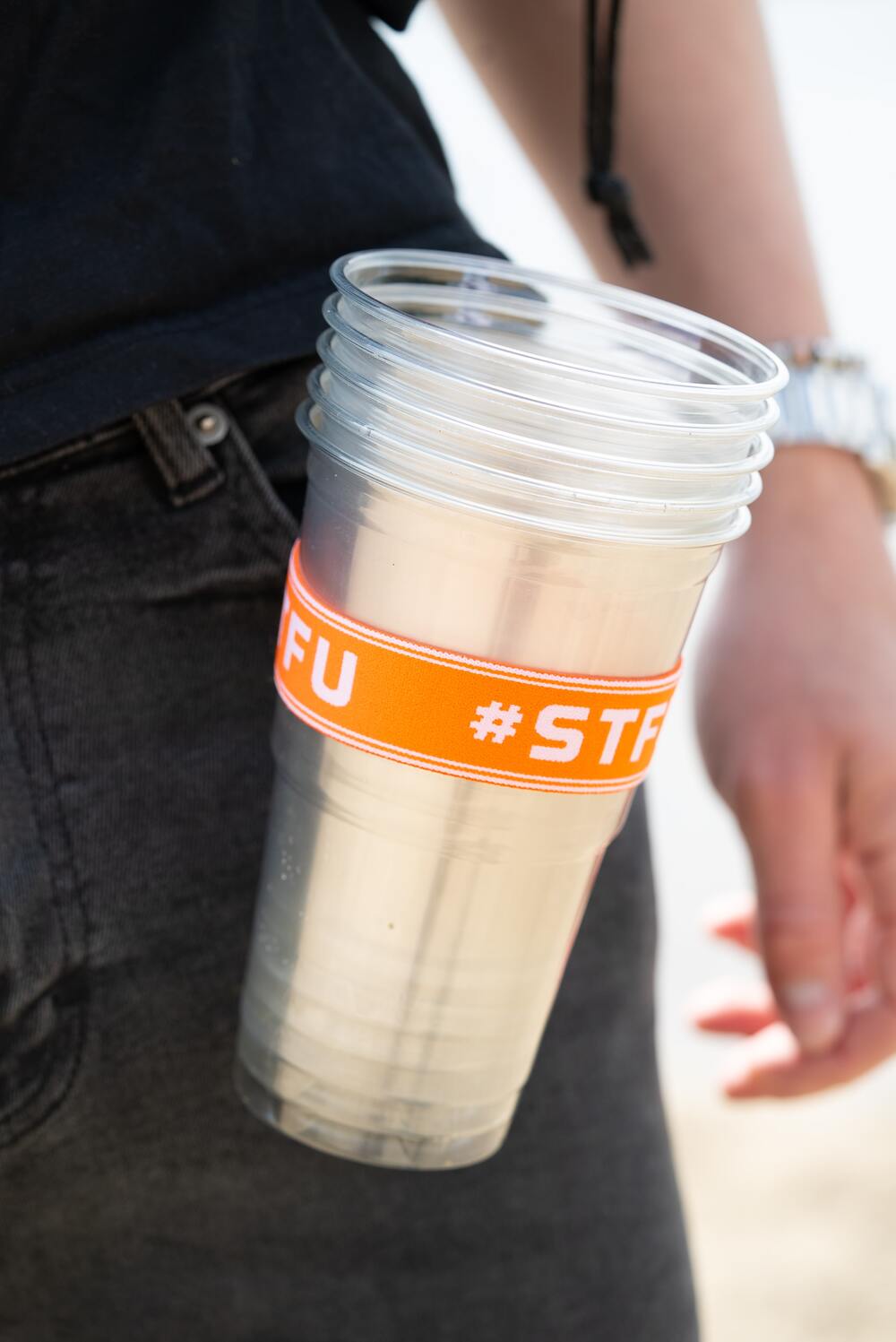Okay, plastic cups can cause quite a few environmental problems at festivals and events. But what exactly are we talking about?
You might not think it while partying and dancing, but plastic cups contribute to quiet but serious pollution. They are often used and thrown away without thinking about it, and that means tons of waste at festivals.
Therefore, the use of plastic cups reinforces the “throw-away mentality. People use them once and then just throw them away, without thinking about the environmental consequences. And let’s face it, festivals are often held in beautiful natural areas. But using plastic cups can lead to pollution of this natural environment.
In addition, plastic cups do not break down easily. Instead, they eventually break down into microplastics, tiny particles that pose a major threat to our ecosystems and even our health. They may seem harmless, but they contribute to major environmental problems.
What Alternatives are there to Plastic Cups at Festivals and How Are They Implemented?
Plastic cups pose an environmental challenge, but fortunately there are alternatives available that festivals can embrace to stem the tide. We found 5 of these alternatives and figured out how they are implemented.
Reusable Cups
One of the most promising alternatives to plastic cups are reusable cups. These cups are made of sustainable materials such as stainless steel or biodegradable plastics. Best of all, they can be used multiple times, which has a huge impact on the amount of waste generated.
Deposit systems
To ensure that festival-goers actually continue to use reusable cups, many festivals have already introduced deposit systems. Festival-goers pay a small deposit when they buy their first drink and can get that deposit back when they return their cup. This encourages people to use their cups responsibly.
Biodegradable Alternatives
Some festivals choose to use biodegradable cups. These cups are made of materials that degrade quickly and leave no harmful residue. They not only reduce plastic pollution, but also reduce the carbon footprint.
Cardboard cups
You would say that cardboard cups fall under biodegradable alternatives. Unfortunately, this is not always true. Many cardboard cups are treated with a waterproof coating to prevent them from getting soggy and falling apart. However, these coatings can still cause environmental problems and must be handled correctly. Without the coatings, it would be a proper alternative as long as the cups are designed to keep them from falling apart if you hold your beer for too long.
Recycling and Upcycling
Another approach is to promote recycling and upcycling. Festivals may have special collection points where festival-goers can deposit their plastic cups for recycling. Some festivals even take the collected cups and turn them into works of art or utensils, which is creative and environmentally friendly.
Awareness campaigns
The implementation of these alternatives is often accompanied by awareness campaigns. Festival-goers are informed about the benefits of reusable cups and encouraged to actively participate in efforts to reduce plastic waste. Educational signs and information points on the festival grounds contribute to this awareness.
The good news is that more and more festivals around the world are embracing and successfully implementing these alternatives. As a result, festival-goers can still enjoy great music, fun and partying without worrying about the negative impact on the environment.
What Are the Benefits of Using Reusable Cups Instead of Disposable Plastic at Events?
It’s time to understand why switching to reusable cups is a game-changer for festivals. Not only are these benefits good for the environment, but they also contribute to a better festival experience. Let’s dive in!
Environmentally friendly and Sustainable
This is a no-brainer. Reusable cups reduce the huge amount of disposable plastic used at festivals. This means less plastic waste in landfills and in our natural environments. It’s a win-win for the environment.
Less Waste, Less Cleanup
Fewer plastic cups means less mess to clean up after the festival. That means less manpower and resources spent cleaning up trash, making festivals more efficient and sustainable.
Cost-saving
Although the initial investment in reusable cups and collection systems may seem like an expense, festivals can save money in the long run. They don’t have to buy new supplies of plastic cups as often, which lowers costs.
Promotion of Sustainability
Festivals often have a big impact on festival-goers, and promoting sustainability can be a powerful message. Using reusable cups shows festivals’ commitment to environmental awareness and inspires others to take the plunge as well.
Are there Regulations or Initiatives that Try to Reduce the Use of Plastic Cups at Festivals?
Yes, there are several regulations and initiatives worldwide that attempt to reduce the use of plastic cups at festivals and events. Let’s look at some notable examples:
Prohibitions and Restrictions
Some regions and cities have banned or restricted the use of disposable plastics, including plastic cups. These regulations prohibit serving drinks in plastic cups and force festivals to use more environmentally friendly alternatives.
Deposit systems
Some countries and regions have introduced deposit systems to encourage festival-goers to use reusable cups. This involves festival-goers paying a deposit when they purchase a drink and getting that deposit back when they return their cup. This system has successfully helped reduce plastic waste.
Environmental certifications
Festivals can participate in environmental certification programs in which they are judged on their sustainability efforts, including the use of reusable cups. These certifications reward festivals that are committed to a greener event industry and can help them attract environmentally conscious sponsors and festival-goers.
Collaborations with Environmental Organizations
Some festivals partner with environmental organizations to raise environmental awareness and promote sustainable practices. These partnerships can lead to educational programs, recycling initiatives and the promotion of reusable cups.
Government support
Some governments offer financial support to festivals to facilitate the transition to reusable cups. This may include grants to purchase reusable cups or install collection and cleaning systems.
These regulations and initiatives are essential to reducing the use of plastic cups at festivals and encouraging festivals to make more environmentally friendly choices. They help create a more sustainable event industry and set an important precedent for future festival organizers.
Now, let’s take a closer look at the economic and environmental costs of using plastic cups at festivals.
What Are the Economic and Environmental Costs of Using Plastic Cups at Festivals?
While plastic cups may seem convenient at festivals, they carry significant economic and environmental costs. It is important to understand these costs to justify the move to more sustainable cup solutions. Let’s take a detailed look at what these costs entail.
Economic Cost
Procurement of Disposable Plastic:
Festivals must repeatedly purchase disposable plastic cups, which has a long-term cost. The price of plastic cups can add up, especially if large quantities are needed.
Cleanup and Processing Costs:
Cleaning up plastic cups after a festival is a time-consuming and expensive task. The waste must be collected, transported and properly disposed of, incurring additional costs.
Environmental damage:
Although primarily an environmental cost, it also has economic consequences. Environmental damage from plastic waste can lead to financial losses, such as reduced tourist appeal and health problems.
Loss of Sponsors and Visitors:
Environmentally conscious sponsors and festival-goers may avoid festivals known for using a lot of disposable plastic. This can lead to loss of revenue and opportunities for collaboration.
Environmental Costs
Plastic Pollution:
The most obvious environmental problem is the pollution caused by plastic cups that end up in landfills or are left in nature. This harms ecosystems and wildlife.
Energy and Resource Consumption:
The production of plastic cups requires significant amounts of energy and raw materials, including petroleum. This contributes to resource depletion and greenhouse gas emissions.
Microplastics:
Plastic cups eventually break down into microplastics, tiny particles that contaminate waterways and oceans. These particles are absorbed by organisms and can enter the food chain, posing potential health risks to humans and animals.
Nature damage:
Plastic cups can end up in natural environments, such as forests, rivers and oceans, where they damage biodiversity and ecosystems.
How Can Festival Goers and Organizers Contribute to Reducing Plastic Waste from Cup Use?
Both festival-goers and organizers play a crucial role in reducing plastic waste at festivals. Here are some ways they can contribute to a more sustainable event industry:
For Festival goers:
Use Reusable Cups:
Participate in efforts to reduce plastic waste by using reusable cups whenever possible. Many festivals offer reusable cups, and some even have deposit systems.
Recycle Aware:
If reusable cups are not available, be sure to place your plastic cups in the designated recycling containers. Learn to recognize the recycling symbols and follow the festival’s recycling guidelines.
Spreading Awareness:
Share your knowledge about environmental awareness with fellow festival-goers. Encourage others to use reusable cups and share tips on sustainable behavior.
Minimize Waste:
Try to reduce unnecessary waste by not using plastic straws and ordering drinks without lids, for example. Small efforts can make a big difference.
For Festival Organizers:
Reusable Cup Initiatives: Invest in reusable cups and implement deposit systems. Encourage festival-goers to use reusable cups by offering discounts on drinks when they use these cups.
Recycling Facilities:
Provide adequate recycling facilities at the festival site. Place clearly visible recycling containers and ensure effective recycling and waste collection.
Educational Campaigns:
Launch educational campaigns to make festival-goers aware of environmental issues and the benefits of sustainable behavior. Inform them about the proper use of reusable cups and the importance of recycling.
Collaborate with Environmental Organizations:
Collaborate with environmental organizations to promote sustainability. This can result in joint awareness campaigns and recycling initiatives.
Environmental certifications:
Consider participating in environmental certification programs to recognize and promote your commitment to sustainability.
By working together and making conscious choices, festival goers and organizers can work together to reduce the impact of plastic cups and contribute to a cleaner, greener festival world.
How Can Festivals Increase Awareness About the Impact of Plastic Cups and How Can They Contribute to a More Sustainable Event Industry?
Festivals have a unique platform to raise awareness and inspire positive change. Here are some ways festivals can contribute to a more sustainable event industry:
Educational Zones and Activities
Festivals can create educational zones where festival-goers can learn about environmental issues, recycling, and the importance of reusable cups. Here, visitors can participate in workshops, discussions and activities focused on sustainability.
Awareness campaigns
Festivals can launch powerful awareness campaigns to educate festival-goers about the environmental impact of plastic cups. Use vibrant visuals, slogans and social media to spread the word.
Artists and Influencers
Famous artists and influencers can support festivals in their commitment to sustainability. These celebrities can perform during the festival and share environmentally conscious messages through their channels.
Stimulating Creativity
Festivals can spark creativity by inviting artists to create sculptures and installations using recycled materials, including used cups. This serves as a visual reminder of the impact of plastic waste.
Partnerships with Environmental Organizations
Collaborations with environmental organizations can help festivals promote sustainability. These partners can provide expertise and resources for educational programs and recycling initiatives.
Incentives for Sustainable Behavior
Festivals can offer incentives for sustainable behavior, such as discounts on drinks for festival-goers who use reusable cups. This encourages positive actions.
Sustainable Catering
Festivals can strive for sustainable catering, serving food and beverages in eco-friendly containers and cups. This reduces the overall carbon footprint of the event.
Monitoring and Reporting
Festivals can closely track their environmental performance and report annually on their efforts to reduce plastic cups. This increases transparency and accountability.
By combining these approaches, festivals can not only reduce the impact of plastic cups, but also foster a culture of sustainability that extends beyond the event itself. They can inspire other events and make a difference in global efforts to reduce plastic pollution.
Now let’s consider some of the challenges and obstacles in reducing plastic cup use at festivals.
Challenges and Obstacles in Reducing Plastic Cup Use at Festivals
While the move to more sustainable cup solutions is a noble goal, there are some challenges and obstacles that festivals must overcome. Here are some of the main ones:
Initial Cost
Purchasing reusable cups and installing collection and cleaning systems can initially be costly for festivals. This can be a barrier, especially for smaller events with limited budgets.
Logistical Complexity
Managing reusable cups and deposit systems can be logistically complex. Festivals must implement effective systems for collecting, cleaning and storing cups between events.
Resistance of Festivalgoers
Some festival-goers may be reluctant to switch to reusable cups, especially if they are used to the convenience of disposable plastic. Raising awareness of the importance of sustainability can take time and effort.
Infrastructure requirements
Installing the necessary infrastructure, such as waste collection stations and cleaning facilities for reusable cups, can be a challenge for festivals, especially if they are held in remote locations.
Environmental Impact of Alternatives
Some alternatives to plastic cups, such as biodegradable plastics, also have environmental impacts. It is important to carefully evaluate which alternative is the most sustainable in the long run.
Cultural Differences
Festival habits and cultures can vary widely around the world. What works in one region may not be obvious in another. Festivals must consider local contexts.
Despite these challenges, it is important to remember that moving to more sustainable cup solutions is achievable and has significant benefits. By working together, being innovative and raising awareness, festivals can overcome obstacles and contribute to a greener event industry.
Now is the time to explore what steps festival organizers can take to implement a more environmentally friendly cup strategy.
How Can Festival Goers Be Encouraged to Use Reusable Cups?
Encouraging festival-goers to embrace reusable cups requires creative approaches and positive incentives. Here are some effective ways to motivate festival-goers:
1. Deposit system
Implement a deposit system where festival-goers pay a small deposit when they purchase a drink in a reusable cup. They get this deposit back when they return the cup to a collection point. This financial benefit encourages reuse.
2. Discounts for Reusable Cups
Offer festival-goers discounts on drinks when they use reusable cups. This makes it more financially attractive to choose reusable options and can lead to higher acceptance.
3. Attractive designs
Provide attractive and eye-catching designs for reusable cups. Festival-goers are more likely to use a cup if it is attractive or can serve as a souvenir.
4. Awareness campaigns
Conduct campaigns to raise awareness among festival-goers about the environmental impact of plastic cups and the benefits of reusable cups. Use signs, banners, social media and artists to spread the word.
5. Rewards and Incentives
Offer rewards for festival-goers who use reusable cups responsibly, such as access to special events or exclusive festival merchandise.
6. Educational Activities
Organize educational activities such as workshops, lectures or demonstrations explaining how festival-goers can make a difference by using reusable cups.
7. Make it Easy
Make sure reusable cups are readily available and accessible on the festival grounds. Festival-goers are more likely to use them if they are available and convenient.
8. Promote Sustainability Culture
Create a culture of sustainability at the festival in which the use of reusable cups is the norm and in which festival-goers are encouraged to inspire each other.
9. Collaboration with Artists
Involve performers in your sustainability efforts. They can share positive messages about reusable cups during performances.
It is important to combine multiple approaches to motivate festival-goers to use reusable cups. The ultimate goal is to promote sustainable behavior and contribute to a greener festival culture.











